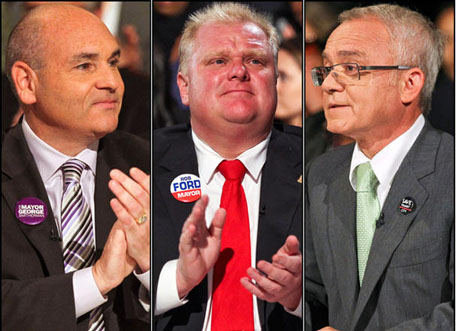Do Ford in Toronto and Fantino in Vaughan mean a new blue tide will sweep Ontario in next federal election?
Dec 1st, 2010 | By Counterweights Editors | Category: In Brief The Canadian Press has nicely captured the combined impacts of at least one (or two?) of this past Monday’s three federal by-elections, and today’s inauguration of the new conservative municipal regime in Canada’s current largest big city. And there is at least some method to our rocket-science madness in summarizing the CP report from the online edition of the Winnipeg Free Press: “Great right hope Rob Ford has taken the reins of power in Canada’s most populous city … The conservative juggernaut’s victory in Toronto and a Tory byelection win in nearby Vaughan have the federal Conservatives predicting that a blue tide will sweep the vote-rich city – and possibly Ontario – in the next election … But experts say Ford is off to a bumpy start …”
The Canadian Press has nicely captured the combined impacts of at least one (or two?) of this past Monday’s three federal by-elections, and today’s inauguration of the new conservative municipal regime in Canada’s current largest big city. And there is at least some method to our rocket-science madness in summarizing the CP report from the online edition of the Winnipeg Free Press: “Great right hope Rob Ford has taken the reins of power in Canada’s most populous city … The conservative juggernaut’s victory in Toronto and a Tory byelection win in nearby Vaughan have the federal Conservatives predicting that a blue tide will sweep the vote-rich city – and possibly Ontario – in the next election … But experts say Ford is off to a bumpy start …”
For our own report on the new mayor’s grasping at the reins of power see the latest installment in our new continuing series: “Streetcar named Rob Ford – The Bobbsey Twins take over” (or should that be Tom Swift?) Meanwhile, Chantal Hébert, whose political wisdom we often admire, has elaborated a bit on the blue tide theory with her current (perhaps somewhat misleadingly titled?) Toronto Star article: “Byelection win paves way for Harper majority.”
The crux of Ms. Hébert’s argument seems to run something like this: “If Liberal Leader Michael Ignatieff loses a seat to the Conservatives for every one he wins off the New Democrats in the next federal election, Prime Minister Stephen Harper will emerge from the campaign with a majority government … That’s the zero-sum opposition game that turned out to be on exhibit in Monday as the Liberals lost the GTA seat of Vaughan to the Conservatives and won Winnipeg North off the NDP … The result of the exercise is a morale-boosting victory for Harper’s ruling party that could point the way to more gains at the expense of the Liberals in the next election … The fact is that the Liberals did not take a single vote off the Conservatives on Monday. On that rather crucial score, the movement went the other way. And the reality is that Ignatieff cannot hope to make up for the loss of thousands of Liberal votes to the Conservatives by siphoning off the smaller NDP pool.”
In this case we do find ourselves wondering a little about the ultimate logic of Ms. Hébert’s argument. And our wondering has been stiffened by Jeffrey Simpson’s column in today’s Globe and Mail: “Nothing in politics is analyzed more excessively, and therefore invariably wrongly, than by-elections. So it has been since Monday night’s results: two wins for the Conservatives and one for the Liberals … Want to read [rather different] national trends into three completely different ridings: suburban Vaughan north of Toronto, urban Winnipeg North and rural Dauphin-Swan River-Marquette? How about this: The Conservative vote fell in two out of three, the Liberal vote rose in two out of three …”
Moreover, Mr. Simpson goes on, in Winnipeg North: “For the NDP, the result was deeply disappointing, because their candidate, Kevin Chief, a Métis, was outstanding.” At the same time: “The party threw a lot into holding its bastion. The NDP share of the vote dropped …. but the Conservative vote collapsed. Presumably, a lot of it went to Mr. Lamoureux [the ultimate Liberal victor].” The Liberals, that is to say, were not just “siphoning off the smaller NDP pool” in Winnipeg North. They were also taking at least half the Conservative vote last time around. (In the 2008 general election the NDP took 63% of the vote in Winnipeg North, the Conservatives 22%, the Liberals 9%, and the Green Party 5%. In Monday’s 2010 byelection, the Liberals took 46% to the NDP’s 41%, the Conservatives 10%, and the Green Party’s less than 1%.)
 As best we can make out, there remains yet another implication to the, as it were, combined political wisdom of Ms. Hébert and Mr. Simpson here, for the broader progressive cause in the next general federal election. Taking another cue from the latest Toronto municipal contest, at any rate, salvation for “leaning forward” in Canada, if such a thing is in the wind at all, will not finally lie in some cross-country collapse of the New Democrat vote in the Liberals’ favour. Contrary to what some are implying these days, Rob Ford did not in fact win a majority this past October 25. If the NDP-leaning Joe Pantalone and the Liberal-leaning George Smitherman had somehow managed to combine forces, they would have defeated the great right hope!
As best we can make out, there remains yet another implication to the, as it were, combined political wisdom of Ms. Hébert and Mr. Simpson here, for the broader progressive cause in the next general federal election. Taking another cue from the latest Toronto municipal contest, at any rate, salvation for “leaning forward” in Canada, if such a thing is in the wind at all, will not finally lie in some cross-country collapse of the New Democrat vote in the Liberals’ favour. Contrary to what some are implying these days, Rob Ford did not in fact win a majority this past October 25. If the NDP-leaning Joe Pantalone and the Liberal-leaning George Smitherman had somehow managed to combine forces, they would have defeated the great right hope!


Maybe it’s because it’s 5:40am, but I’m a little unclear about the logic in the last two sentences. Do they not contradict each other?
Tks for the query Ian. It may be that we composed the last two sentences in too much cyberspace haste ourselves. Maybe they do require some further elucidation.
As we think about it the day after, the problem could have something to do with the differences between our municipal and federal political institutions. We don’t have in federal politics any exact analogue for the mayoral race at the municipal level. Ie, we don’t directly elect the prime minister. The logic in our federal system is more like what the municipal system would be if the mayor were chosen after the election, by the municipal councilors, from among their own number. And then, if that were the case, parties would likely develop at the municipal level, and the mayor would become the leader of the party with the majority of seats on council, and so forth.
Anyway, our point is just this. The NDP leaning Pantalone vote did not collapse in favour of the Liberal leaning Smitherman in the Toronto election. And as various people predicted beforehand that was enough to let Rob Ford win — even though Pantalone and Smitherman together won more votes than Ford. If Pantalone had made some kind of deal to support Smitherman, that might well have kept Ford from winning. But the problem with municipal politics is that there is no real incentive for this kind of deal. Pantalone would just disappear — and who wants to do that.
In federal politics the situation is different, for better or worse. And in this case we’d say better. We don’t think the NDP vote is going to collapse in favour of the Liberals in the next federal election either — no matter how often the current Liberal hierarchy says it will. But if the Liberals and New Democrats combined wind up with more seats in Parliament than the Conservatives (and especially if they wind up with an actual majority of seats), then the door is open for some kind of Liberal-NDP accord government, as an alternative to yet another Conservative minority government. (Ignatieff can be prime minister, but Layton, who has his own seat in Parliament, could be part of the new government, even possibly as a senior cabinet minister or some kind of deputy leader: he doesn’t just have to disappear like Pantalone at the municipal level.) We still think something like this is the best hope for a progressive alternative in the next Canadian federal election. And we think that is what both the Toronto election and the three recent federal by-elections (and the columns of Ms. Hebert and Mr. Simpson for that matter) suggest as well, when most astutely interpreted. Obviously your lack of clarity Ian shows that in this instance we didn’t make our case very well. Our apologies. And cheers.